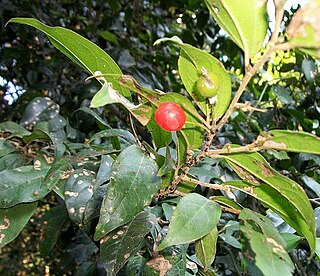
Podocarpus latifolius is a large evergreen tree up to 35 m high and 3 m trunk diameter, in the conifer family Podocarpaceae; it is the type species of the genus Podocarpus.

The Zagros Mountains forest steppe is a temperate broadleaf and mixed forests ecoregion in Western Asia. The ecoregion extends along the Zagros Mountains, stretching from eastern Turkey and northern Iraq to southern Iran.

Celtis laevigata is a medium-sized tree native to North America. Common names include sugarberry, southern hackberry, or in the southern U.S. sugar hackberry or just hackberry.

Podocarpus milanjianus is a species of conifer in the family Podocarpaceae. It is native to the highlands and mountains of tropical Africa.
Shorea revoluta is a species of plant in the family Dipterocarpaceae. It is a tree endemic to Borneo.

Syzygium guineense is an evergreen leafy forest tree of the family Myrtaceae, found in many parts of Africa both wild and domesticated. Both its fruits and leaves are edible; the pulp and the fruit skin are sucked and the seed discarded. It is sometimes called "waterberry", but this may also refer to other species of Syzygium.

Celtis mildbraedii is a species of forest tree in the family Cannabaceae. It was previously assigned to the family Ulmaceae. These trees grow in limited areas of South Africa, Mozambique and Zimbabwe. They are also found in forested areas from West Africa to Sudan, DRC, Angola and Tanzania. Common names include natal white stinkwood, red-fruited white-stinkwood and natal elm. This species is more common in Tropical Africa than in Southern Africa.

Trema orientale is a species of flowering tree in the hemp family, Cannabaceae. It is known by many common names, including charcoal-tree, Indian charcoal-tree, pigeon wood, Oriental trema, and in Hawaii, where it has become naturalized, gunpowder tree, or nalita. It has a near universal distribution in tropical and warm temperate parts of the Old World, with a range extending from South Africa, through the Middle East, the Indian subcontinent and southern China to Southeast Asia and Australia.

Diospyros whyteana is a small African tree of the ebony family. Bearing dark green, strikingly glossy leaves and creamy fragrant flowers, it is increasingly cultivated in Southern African gardens as an attractive and strong ornamental tree. It can attain a height of up to 6 m.

Ilex mitis is a tall, dense, evergreen tree that is indigenous to Sub-Saharan Africa and Madagascar. It makes an excellent fast-growing hedge for gardens - growing tall, straight and dense.
Celtis zenkeri is a species of flowering plant native to sub-Saharan Africa.
Celtis madagascariensis is a species of flowering plant endemic to Madagascar.

Celtis philippensis, is an Asian species of flowering plant in the family Cannabaceae. It is a tree which can grow up to 30 meters tall. It ranges from India and Sri Lanka to southern China and Taiwan, the Philippines, New Guinea and the Solomon Islands, and northern Australia.
Cinnamosma madagascariensis is a species of flowering plant in the family Canellaceae. It is endemic to Madagascar., where it is known as sakaihazo.

Magnolia sharpii is a tree species of Magnolia from Chiapas, Mexico. It grows in wet tropical habitats.

The Victoria Basin forest–grassland mosaic is an ecoregion that lies mostly in Uganda and extends into neighboring countries. The ecoregion is centered north and west of Lake Victoria, with an outlier on the border of Ethiopia and South Sudan.

Cassipourea malosana is a species of plant native to tropical Africa.
Quercus furfuracea is a species of oak native to eastern Mexico.
Croton macrostachyus is a species of flowering plant native to the mountains of Sub-Saharan Africa.
Aningeria pierrei is a species of plant in the family Sapotaceae. It is a tree native to the tropical forests of west and west-central Africa, from Guinea Bissau to the western Central African Republic. It is commonly known as aningré blanc, and is a source of the timber known as anigre.














